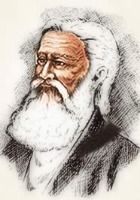Rahman Baba
Rahman Baba Poems
You ask, my love, about my tears
But don't you recognize the fears
That agonize my heart?
...
Lights in the world are those, who know,
Guides of mankind are those, who know
When looking for the road to God
And prophet, ask from those, who know
...
Live not with thy head showing in the clouds,
Thou art by birth the offspring of this earth,
...
What a marvelous creator is my Lord:
All authority is subject to my Lord
All the holy ones of old you may recall,
Unsurpassed in excellence is still my Lord
...
Rahman Baba Biography
Abdul Rahman Baba (Pashto: عبدالرحمان بابا; popularly Rahman Baba, Pashto: رحمان بابا), was a Pashtun poet from Peshawar in the Mughal Empire (modern-day Pakistan). He remains the most popular poet among the Pashtuns in Afghanistan and Pakistan. His poetry expresses a peaceful mystical side of local culture which is becoming increasingly threatened by less tolerant interpretations of Islam.
The Best Poem Of Rahman Baba
Agony Of Love
You ask, my love, about my tears
But don't you recognize the fears
That agonize my heart?
Were not your infidelity
Torturing me so cruelly
My sorrows would depart
How can your lovers joyful be
If practicing idolatry
Is just like loving you?
If this your real nature is
What wounded heart can find release?
What medicine will do?
I sense, that you have turned aside
I suffer from my rivals' pride
I'm killed in either way,
If one makes love to Plato's tune
To me he'll always be Manjun
Tomorrow as today
No dog is subject to such pain
I'm like a watchdog in your lane
And yet I suffer still,
A dog wants naught, RAHMAN wants you
This single goal I must pursue
Whatever be your will
(Translated by Jens Enevoldsen, from the book The Nightingale of Peshawar: Selected Poems of Rehman Baba)

Abdul Rahman Baba; a true pious and virtuous person; every word by him is a true food of spiritual heart and soul